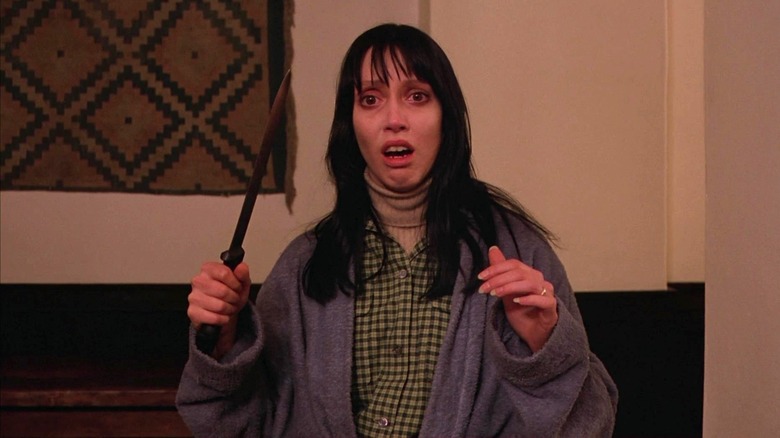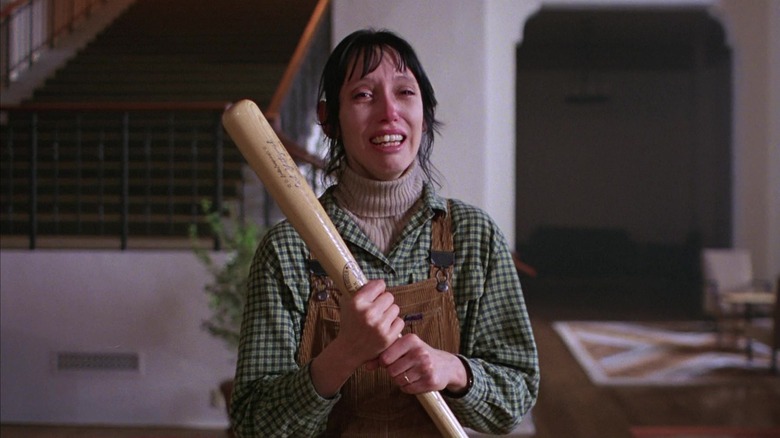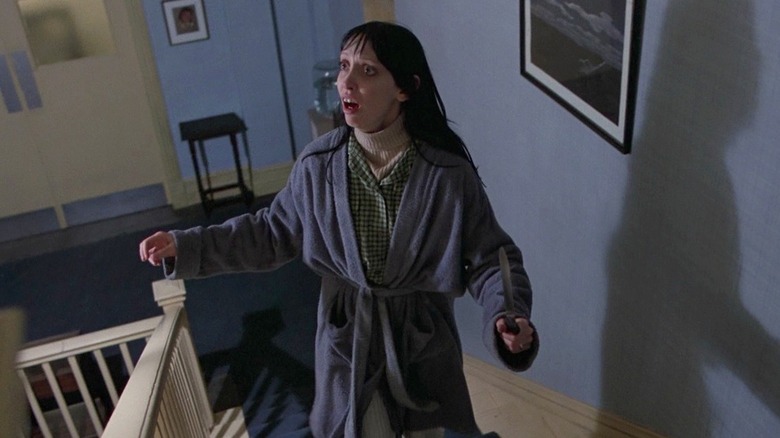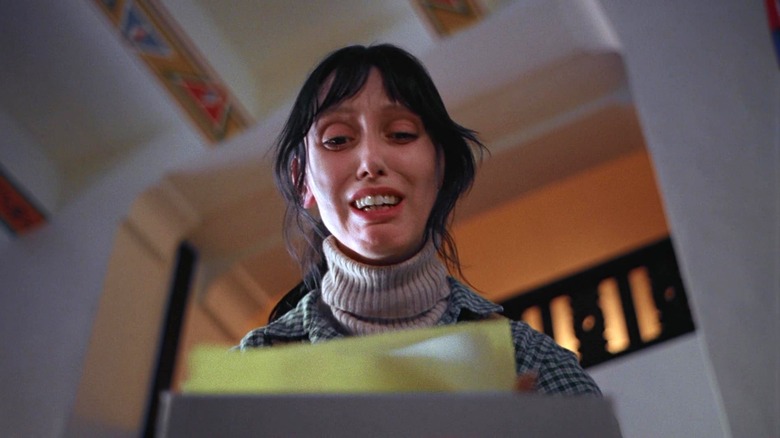Shelley Duvall's Legacy Deserves Better Than The Shining Urban Legend
We may receive a commission on purchases made from links.
In a now-infamous video shot by 19-year-old Vivian Kubrick, her father Stanley calls action for Shelley Duvall before a scene in "The Shining." Perhaps it's because Kubrick is outside and Duvall is behind a large door to the set of the Overlook Hotel, or perhaps the sound of Kubrick calling for action is muffled by the snow machine blasting at the set, but Duvall misses her cue. Kubrick calls "cut," and then reams her out, saying, "You're wasting everyone's time."
Following this clip, the making-of documentary shows Duvall saying that she doesn't think her performance would have been as good if Kubrick hadn't gotten a rise out of her. She also notes that Kubrick knowingly treated her this way in order to get the performance. She looks calm. She smiles.
In the years since the release of "The Shining," much has been revealed about the horrendous working conditions for all of the cast and crew of the film. Anjelica Huston, who was dating Jack Nicholson at the time, told The Hollywood Reporter, "I got the feeling, certainly through what Jack was saying at the time, that Shelley was having a hard time just dealing with the emotional content of the piece. And they didn't seem to be all that sympathetic. It seemed to be a little bit like the boys were ganging up."
She also added "That might have been completely my misread on the situation, but I just felt it. And when I saw her during those days, she seemed generally a bit tortured, shook up. I don't think anyone was being particularly careful of her."
For decades, this line of thinking has been the prevailing narrative of Duvall's time on "The Shining." But comments made before her passing put things into a new perspective. This article is a course correction — a means to question the urban legend of "The Shining," and accountability for having perpetuated it.
Where does the urban legend come from?
During one of "The Shining's" most iconic scenes — the baseball bat confrontation on the stairs — Kubrick made Duvall and Nicholson shoot the scene in an alleged record-setting 127 takes, something that horror fans love to spout off as a fun bit of trivia. This number was debunked in Lee Unkrich's book, "Stanley Kubrick's The Shining," although it was certainly a physically taxing ordeal nonetheless. The result of the constant takes was Duvall's hands were shredded raw from gripping the bat for such a prolonged period, her voice was hoarse from crying, her eyes became swollen, and she left the set completely dehydrated. Many have concluded that the moments we see on screen of Duvall crying in pain, fear, and exhaustion were not acting but an actor delivering lines while enduring a trauma response.
As she told THR, "To wake up on a Monday morning, so early, and realize that you had to cry all day because it was scheduled — I would just start crying." She continued, "I'd be like, 'Oh no, I can't, I can't.' And yet I did it. I don't know how I did it. Jack [Nicholson] said that to me, too. He said, 'I don't know how you do it.'" The documentary "Stanley Kubrick: A Life in Pictures" doesn't shy away from the filmmaker's methods, with co-star Jack Nicholson admitting that Kubrick acted like "a different director" when dealing with Duvall. At one point, Duvall is shown lying on the floor with assorted cushions around her. According to in an interview with ComingSoon.net, Duvall said, "For the longest time I couldn't remember what exactly was happening at that moment, but I do recall I had a really bad anxiety attack on set, and I believe that was what is shown in the documentary." Duvall continued "The shoot was very hard on me and I got to the point where I just couldn't take anymore, I needed a break, but taking a break costs money and people need the shot done, so I had a little breakdown," she said.
With years of similar comments like this, the documentary footage, and Duvall's exit from Hollywood in 2002, it was the perfect storm for fan speculation.
Shelley Duvall prevailed, but Kubrick isn't off the hook
Another thing Duvall mentioned to ComingSoon was that, "[Kubrick] has a vision in his head of what he wants to see through his camera and if you don't quite understand where he is coming from he gets frustrated and angry." She continued, "Communication and understanding plays a big part of film sets, I just wasn't getting it, I did in the end." It's hard to hear Duvall speak about the experience because, despite describing what is clearly an unacceptable work environment and mistreatment, she's still optimistically trying to justify what happened to her. The reality is that no actor should be pushed to the point of having an anxiety attack on set, and if the circumstances become this extreme, protective measures need to be taken. Duvall deserved better.
"Even though the atmosphere on set was sometimes unpleasant, I'm now remembered for a film that's become a horror classic, the fact that people are still watching and talking about it 31 years later amazes me," she concluded. And here is where the disconnect comes in. Shelley Duvall does not see herself as someone who was mistreated and vocally expressed her respect for Kubrick's vision, but that doesn't mean Kubrick's behavior is acceptable.
It's a natural if not parasocial reaction for many to have, myself included, because Shelley Duvall is an adored actor and a cultural hero. Those who love her and her work feel protective of her, and we should be critiquing Kubrick's behavior without allowing it to take over the narrative or legacy of Duvall's life. An earlier version of this article was titled "How 'The Shining' Changed Shelley Duvall Forever," which is still a true statement, but not for the reasons initially published.
How The Shining actually changed Shelley Duvall forever
Years before Duvall starred as Wendy Torrance in the film that many consider to be one of the greatest horror pictures ever put to film, she broke through with her frequent collaborations with Robert Altman. Her performance in his psychological thriller "3 Women" is nothing short of brilliant, winning her the Best Actress Award at the 1977 Cannes Film Festival, and multiple critics' choice awards as well. After "The Shining" she brought a pop culture staple to life by playing Olive Oyl in "Popeye" and became a beloved figure in children's entertainment with her Emmy-nominated "Tall Tales & Legends" and "Shelley Duvall's Bedtime Stories," eventually winning a Peabody for "Faerie Tale Theatre." But "The Shining" did change Duvall forever, because as is the case with anyone who stars in a genre-defining work of horror — it solidified her place as an icon.
As I stated at the time of her passing, "Her fearless portrayal set the standard for tortured women on screen, but she was so much more than Wendy Torrance. Duvall is a testament to resilience [...], but Duvall should not be defined by her hardships." She was a singular presence and one that generations will continue to rediscover until the sun burns out. As much as I would love to think it's because the general, non-film-obsessed public will continue to pass down Altman's films in an act of generational sharing, it will be because of "The Shining," and countless new audiences will get to fall in love with her talent over and over again.
We lost a legend when she passed, but the legend should be that of a brilliant and talented actor who was better than an auteur's vision ever could have imagined.



